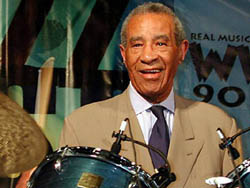
August 18, 2007

August 18, 2007
The Night Max Roach Conquered Havana
Pedro de la Hoz
pedro.hg@granma.cip.cu

When US jazz great Max Roach came to the Havana International Jazz Plaza Festival in 1989 he spoke to Cuban writer Leonardo Acosta about his first trip to Cuba in the mid-1950s. The legendary drummer said that he had made the trip after hearing stories about shows at the Tropicana Cabaret and about the Cuban musicians there who made jazz music their own. Sadly, Roach wasn’t allowed to enter the club in pre-revolutionary Cuba because of the color of his skin.
Max Roach, considered the most important drummer in the history of jazz, received a completely different welcome at the 1989 Jazz Plaza Festival. He conquered Havana, joining the percussion section of Irakere to put on display his domination of a wide range of rhythms. After that memorable jam session, Roach lavished praise on Cuban kit drummers Enrique Pla and Oscarito Valdes, conga player Miguel Anga, and veteran musician Oscar Valdes, who played the chequeré and the batá drums. Nine years later, presided by former Irakere bandleader Chucho Valdes, Jazz Plaza dedicated its 18th festival to Roach.
Max Roach died in New York on Thursday, August 16. He was 83. With his death, an unforgettable era of jazz, of the big names and founders of bebop, comes to a close.
Max Roach helped invent modern jazz in the 1940s, playing in groups with Dizzy Gillespie, Charlie Parker, Coleman Hawkins, Duke Ellington, Sonny Rollins, Charles Mingus, Thelonius Monk and Miles Davis, and left an unforgettable mark of ‘hard bop’ in the quintet he formed in 1954 with trumpeter Clifford Brown.
Critics praised Roach for his improvisations and rhythmic innovations, and for his nonconformist attitude that took him beyond the confines of jazz to work with gospel choirs, hip-hop bands, visual artists and a whole gamut of musical expressions.
Max Roach once said that anyone can acquire technique, but that the real challenge is to bring a seal of individuality and identification.
Roach did not live isolated in his music. He was an activist who often lent his support to the African-American civil rights movement. In 1985, he was among the main figures to perform at a concert calling for the release of Nelson Mandela.
18 de agosto 2007
La noche en que Max Roach pudo conquistar La Habana
Pedro de la Hoz
pedro.hg@granma.cip.cu
http://www.granma.cubaweb.cu/2007/08/18/cultura/artic01.html
 Cuando
Max Roach vino al festival internacional Jazz Plaza en 1989, Leonardo Acosta le
arrancó una confesión. No era la primera vez que el célebre baterista
norteamericano estaba en Cuba. Dijo haber venido a mediados de los años
cincuenta y quiso entonces acceder a Tropicana, intrigado por lo que había oído
hablar de sus espectáculos y, sobre todo, de los músicos cubanos que allí hacían
suyas las sonoridades del jazz. Pero le negaron la entrada por negro.
Cuando
Max Roach vino al festival internacional Jazz Plaza en 1989, Leonardo Acosta le
arrancó una confesión. No era la primera vez que el célebre baterista
norteamericano estaba en Cuba. Dijo haber venido a mediados de los años
cincuenta y quiso entonces acceder a Tropicana, intrigado por lo que había oído
hablar de sus espectáculos y, sobre todo, de los músicos cubanos que allí hacían
suyas las sonoridades del jazz. Pero le negaron la entrada por negro.
Otra resultó la acogida en Jazz Plaza. Roach conquistó definitivamente a La Habana, sobre todo cuando se integró a la línea de percusión de Irakere y demostró con creces su amplísimo espectro rítmico. Al término de aquella memorable sesión prodigó elogios a los bateristas Enrique Pla y Oscarito Valdés, al tumbador Miguel Angá y al veterano Oscar Valdés, quien ofició en el chequeré y los tambores batá. Bajo la presidencia de Chucho Valdés, Jazz Plaza le dedicó nueve años después la decimoctava edición del festival.
Roach murió el último jueves a los 83 años de edad en Nueva York. Con su adiós quedó una época atrás, la de los grandes nombres del bebop, los extraclase que modificaron la corriente jazzística principal en los años cuarenta. No por gusto Charlie Parker, Coleman Hawkins, Duke Ellington, Thelonius Monk y Miles Davis contaron con él. Y como para nunca olvidar su quinteto de hardbop coliderado por Clifford Brown.
La crítica consagró a Roach por sus improvisaciones e innovaciones rítmicas, y una actitud heterodoxa en la que sobrepasó las fronteras del jazz al colaborar con coros de gospel, grupos de hip-hop, artistas visuales y todo tipo de iniciativas musicales.
"Cualquiera puede adquirir la técnica, pero el verdadero reto es traer a este mundo un signo de individualidad y de identificación", dijo en una ocasión seguramente pensando en su larga dedicación a la ejecución jazzística.
Roach no vivió aislado en su
música. En varias ocasiones manifestó su adhesión a la lucha por los derechos
civiles de la comunidad negra en su país. Y en 1985 estuvo entre los principales
protagonistas del concierto internacional por la libertad de Nelson Mandela.
================================================================================
MENDACITY
by Max Roach and C. Bayen
Mendacity, mendacity, it makes the world go round.
A politician makes a speech and never hears the sound.
The campaign trail winds on and on in towns from coast to coast.
The winner ain't the one who's straight, but he who lies the most.
Now voting rights in this fair land we know are not denied.
But if I tried in certain states, from treetops I'd be tied.
Mendacity, mendacity, it seems is everywhere.
But try and tell the truth, and most folks scream "Not Fair!"
Incomplete: 30 seconds from MENDACITY can be heard here:
http://tinyurl.com/2y7sgx
Vocal: Abbey Lincoln
From the Impulse album
Percussion Bitter Sweet
recorded 1961